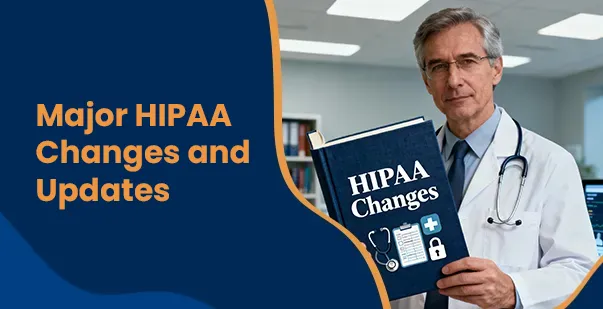HIPAA Changes 2025: What Healthcare Professionals Need to Know

October 8, 2025
A 2022 Ponemon Institute survey found that nearly 9 in 10 healthcare organizations experienced an average of 43 cyberattacks in a 12-month period — highlighting the urgency of stronger safeguards
This article walks healthcare professionals through the latest HIPAA changes for 2025. We’ll break down the new rules, what you need to do to stay compliant, and how these updates could impact your daily operations.
As cyber threats ramp up and technology quickly evolves, the HIPAA law changes taking effect in 2025 require healthcare organizations to make critical security and compliance upgrades, according to the latest review in ‘Newest HIPAA Rules’ (2025).
What Are the Major HIPAA Law Changes Coming in 2025?
HIPAA – the Health Insurance Portability and Accountability Act – has long protected sensitive patient information across the United States. But technology has changed a lot since HIPAA’s Security Rule first rolled out in 2003.
Recent Developments
With healthcare relying on new digital tools and facing more cyber risks, it’s clear the old regulations don’t cut it anymore. HHS/OCR proposed a 393-page update (NPRM) on Jan 6, 2025; it’s not final yet.: the rules are about to get a lot tougher.
The most recent major update before this was clear back in 2013. Since then, online threats have exploded, and healthcare now depends even more on digital systems.
What to Expect
The proposed 2025 Security Rule would require data encryption, multi-factor authentication, network segmentation, real-time monitoring, semi-annual vulnerability scans, and annual penetration testing. Smaller clinics and independent practices, in particular, may feel some pressure as they adjust – the changes will take time and money.
But these updates are here for a reason: modern technology leaves gaps the old law never imagined. For example, the proposed rule specifically mentions encryption of ePHI at rest and in transit, multi-factor authentication for logins, network segmentation to isolate sensitive data, and real-time logging and monitoring of access attempts. To keep up with patient expectations and to stay on the right side of regulators, healthcare groups need to embrace these HIPAA regulation updates without delay. (Source: University of Maryland IT Security Services)
If you haven’t already, review your current compliance program and identify any policies from the last decade that might be outdated; you’ll want to patch these gaps before new HIPAA updates 2025 roll out and catch your team off guard.
How Will The New 2025 HIPAA Rules Shape Data Security and Patient Privacy?
The 2025 HIPAA changes are set to affect every health organization – from large hospital systems down to solo practices.
One major proposed update is more structured assessments: annual penetration testing, semiannual vulnerability scans, and at-least-annual reviews of security risk analysis and safeguards.
The proposed rule includes stricter network security standards — such as real-time monitoring and logging of network activity, along with faster detection and response to cyber risks.
Health organizations hold more sensitive data than ever before – think electronic health records, digital appointment systems, and patient portals. While these tools make caregiving easier and faster, they also create new opportunities for hackers. Studies now show that most organizations deal with 43 cyberattacks a year, making stricter standards essential.
What This Means For You
The proposed HIPAA regulation updates ask organizations to keep pace with digital change but also stay centered on patient privacy. Teams must increase security training, regularly update technology, and set aside more budget for new compliance requirements – all while keeping the focus on patient health and safety. (Source: Purdue University CyberTAP ‘Newest HIPAA Rules’). For instance, a small rural clinic might need to upgrade outdated Wi-Fi routers, enable MFA on staff email accounts, and hire an external vendor to conduct annual penetration testing.
One more thing: set up a quarterly check-in to review digital vulnerabilities with your IT staff or outside cybersecurity pros – waiting a whole year between checkups could leave you exposed as hacking techniques change fast in healthcare.
How Are Reporting and Administrative Rules Changing Under HIPAA Updates 2025?
One of the standout changes in the HIPAA updates 2025 is about administrative efficiency and transparency.
Faster Reporting, Tighter Deadlines
A July 31, 2025 Federal Register notice reiterated an existing requirement: providers must update required National Provider Identifier (NPI) data within 30 days (45 CFR 162.410(a)(4)). This is not new, but often overlooked. In the past, these reports could take months, which slowed down how fast risks were identified and resolved.
This is not just about more paperwork. With these new rules, the entire industry is expected to become leaner, more transparent, and quicker with compliance updates. Regulatory agencies now want up-to-date, accurate information at all times.
Small Practices Take Note
Smaller healthcare organizations will need new systems inside their clinics to keep track of important changes and make sure everyone follows the new deadlines. This can be stressful, but it should help lower the old, time-consuming paperwork burden and create a more straightforward path to meeting compliance.
To keep up, you’ll need to audit and refresh your compliance processes, and make sure staff are trained on the new timeline and requirements. (Source: Federal Register 2025-14478)
Try using digital compliance management tools to streamline documentation and reminders for these shorter deadlines – automation eases the stress and helps small practices keep pace with new HIPAA law changes without drowning in manual tracking.
What Should Healthcare Groups Do Now to Prepare for HIPAA Regulation Updates?
The new HIPAA law changes in 2025 are about more than just following new rules – they trace a bigger push on cybersecurity and patient safety nationwide.
The Department of Health and Human Services (HHS) Office for Civil Rights (OCR), which enforces HIPAA, reports that data breaches involving ePHI continue to rise year over year.
With this in mind, the new HIPAA updates bring clear standards for things like:
- Encryption of all health data
- Multi-factor authentication (sending a text code or using an authenticator app for logins)
- Regular tests to find weaknesses in your system
Building a Security-Focused Workplace
Leaders in government and at the organization level now expect a proactive approach – not just patching holes after a breach happens. One useful strategy is running a quarterly tabletop exercise: simulate a ransomware attack on your EHR system and walk through how staff would detect it, who would be notified, and how quickly services could be restored. That means education for all staff, refreshing privacy policies, and creating a culture where everyone feels invested in protecting patient info.
A real commitment from leadership is needed at every level. The 2025 HIPAA regulation updates are about building a healthcare system that is not just harder for cybercriminals to breach, but one that maintains patient trust over the long haul.
Start now by appointing a HIPAA compliance champion or task force – having one or two people in charge of tracking HIPAA regulation updates makes it easier for everyone else to stay focused and informed as 2025 approaches.
| 2025 HIPAA Security Focus | What’s Required | Why It Matters |
| Encryption & Multi-factor Authentication | Encrypt all health data and use a second verification method (like text codes) for logins. | These steps make it much harder for hackers to access sensitive patient information. |
| Regular Security Testing | Test your systems often to spot and fix security gaps before there’s a data breach. | Proactive tests help find weaknesses and keep your tech up to date. |
| Staff Education & Leadership Commitment | Train all employees on privacy policies and create a workplace culture of data security. | When everyone is committed, it’s easier to protect patient trust and meet new rules. |
What Practical Steps Can You Take to Stay Compliant with HIPAA in 2025?
The latest HIPAA updates for 2025 make compliance everyone’s responsibility – not just IT’s problem.
Organization-Wide Action
Healthcare leaders need to develop step-by-step plans for things like the new annual audits, faster data reporting, and improved digital security. Pulling in expertise – whether from compliance consultants or industry associations – can help especially smaller clinics get a handle on the changes.
Ongoing Education and Collaboration
Teamwork between legal, compliance, tech, and front-line staff is key. Everyone should know their new roles under the HIPAA law changes. Focused, ongoing training can help keep everyone up to speed, even as the rules evolve.
Embedding these new practices into your daily routine not only keeps fines and security risks down, but shows patients and the public that you take their privacy and well-being seriously.
Regularly schedule brief, real-world scenario drills – like mock data breaches or reporting exercises – so your team knows what to do in a crunch and can catch any workflow snags before an actual audit or attack hits.
Conclusion
HIPAA compliance is entering a new era with the sweeping 2025 reform – the biggest shift in over a decade. Healthcare organizations can meet this moment by tightening up security, improving how quickly they share information, and making compliance a daily habit for every team member. Now is the time to dig into the proposed rules, consult experienced advisors, and get your plans in order before enforcement ramps up. Keeping patient data safe isn’t just about following new laws – it’s about building trust and ensuring people get the best possible care under the new HIPAA rules.
FAQs
Q: What are the key HIPAA changes for 2025?
A: The HIPAA changes 2025 include stronger safeguards such as multi-factor authentication, encryption of ePHI, network segmentation, real-time monitoring, regular security testing, and clearer expectations for annual reviews. These HIPAA regulation updates aim to improve cybersecurity and protect electronic protected health information in today’s digital healthcare environment.
Q: How do the new HIPAA rules 2025 affect smaller healthcare organizations?
A: The new HIPAA rules 2025 may bring higher costs and operational demands for smaller organizations. Increased audit and security requirements could impact their budgets more than larger groups with greater resources.
Q: Why are these HIPAA regulation updates necessary in 2025?
A: With frequent cyberattacks and growing technology use, HIPAA updates 2025 strengthen ePHI security. These changes will help healthcare organizations stay responsive to a rapidly changing privacy and security landscape.
Q: What timeline changes come with HIPAA administrative simplification in 2025?
A: With HIPAA administrative simplification, covered entities must now report changes to required data elements within 30 days. This faster timeline makes compliance more efficient with the 2025 HIPAA law changes.





